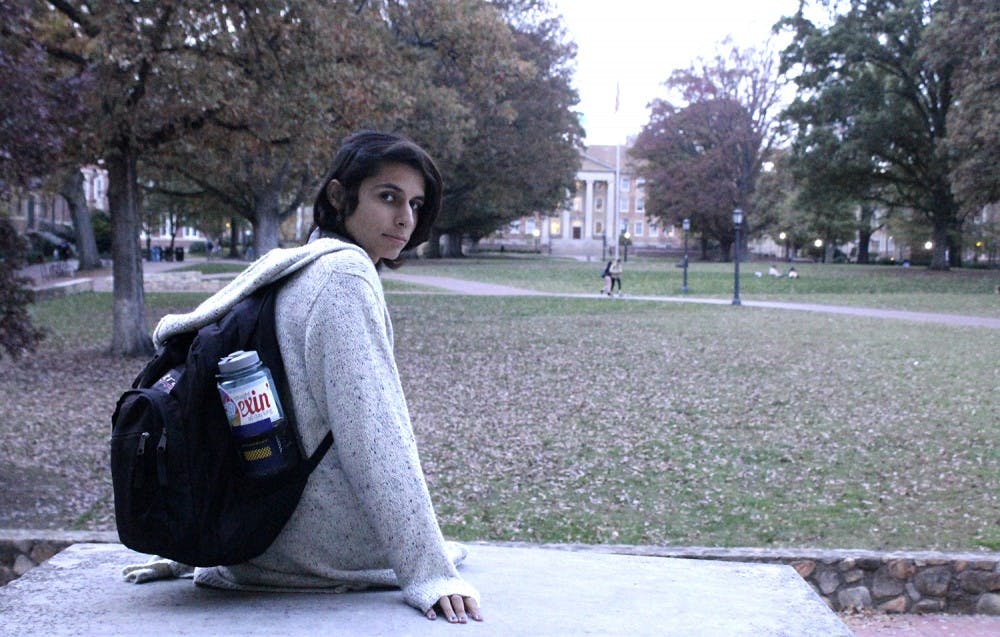She said their relationship is fantastic.
“They’re the most supportive people,” she said. “They’re the best parents I could wish for.”
Fadale’s mom said she is proud of her daughter.
“She could quietly hide and go through this transition, which would make it all easier for everybody, but she’s chosen not to because she wants the people who are going through it or are coming across a trans person to have some understanding,” she said.
“I think she’s very brave.”
‘The argument is invalid’
Fadale wakes up in her single room in Cobb Residence Hall at 8 or 9 a.m. — unless she wants to shower that morning. She typically goes to bed at midnight — unless she wants to shower that night.
“When I do shower, I try and go really early or really late. Whenever I see women in there — maybe I put this on myself — I kind of feel them questioning my presence in there,” she said.
Fadale uses the guest bathroom in the lobby of Cobb.
“That’s the bathroom I go to for everything besides showering,” she said.
But despite her peers’ judgmental glances and implied discomfort, Fadale remains thoughtful in her reclusion.
“I want them to feel safe,” she said. “I try not to disturb the peace.”
To get the day's news and headlines in your inbox each morning, sign up for our email newsletters.
The implementation of gender-neutral bathrooms has seen debate nationally and at UNC.
Earlier this month, Student Body President Houston Summers said he and other student government members have pinpointed single-stall bathrooms on campus that could be potentially converted to gender-neutral.
As for the lack of gender-neutral bathrooms on campus and the popular argument that they are unsafe, Fadale said the argument is invalid.
“I think it’s kind of ridiculous all single-stall bathrooms aren’t already gender-neutral,” she said. “The whole argument that it would make people feel unsafe to have gender-neutral bathrooms just doesn’t apply to single-stall bathrooms.”
Terri Phoenix, director of UNC’s LGBTQ Center, said gender nonspecific housing is essential for an inclusive campus.
“There are some things that we need on this campus in order to make it welcoming and inclusive for trans-identified people. Gender nonspecific housing is one of those issues,” Phoenix said.
Yet converting bathrooms would not solve other problems trans students face.
Safety
Fadale just ordered her “gi,” the white uniforms worn by those who practice martial arts.
After attending FallFest in search of a self-defense group, the chemistry major joined the Aikido Club.
“I wanted something to protect myself with,” she said.
“I’m very afraid of this campus at night — it doesn’t feel safe,” she said. “Not a lot of people talk about it, but there’s a very high incidence of sexual assault on campus.”
In fact, 36.4 percent of transgender, genderqueer or intersex students, faculty or staff at UNC said they feared for their physical safety because of their gender identity or expression, according to the 2011 Campus Climate study compiled by the Provost’s Committee on LGBT Life.
And although Fadale has only been a student at UNC for 90 days, the 18-year-old is a survivor.
“I have been sexually assaulted here,” she said.
Representation, respect
This week is Transgender Awareness Week, but Fadale said even within the UNC LGBT community, trans people are often overlooked. She attributes this exclusion to the greater percentage of cis queer people.
The word “cisgender” refers to those who identify with their assigned sex at birth, who are not transgender.
Fadale said although there are more trans students at UNC than her high school, there is still a gap between trans and cisgender students. In the Provost Committee’s report, 91.6 percent of participants selected “male” or “female” when asked about gender identity, while only 0.9 percent selected “transgender,” “transgender male” and “female transgender.”
This disparity between trans and cis people could explain a reluctance to honor the LGBT-friendly language, such as preferred pronouns.
Brennan Lewis, who identifies as genderqueer and prefers they/them pronouns, said there are students who don’t respect preferred pronouns.
“Sometimes people will ask for others to use others to describe them, and other people will not respect their choices,” they said.
Phoenix said the center aims to represent trans voices.
“In terms of represented and voices heard, I think the center tries to bring those voices to the table,” Phoenix said.
Activism
Fadale is at a meeting nearly everyday.
She is on the executive board of UNC-CH SWIRL, UNC’s first multiracial student organization. She is also part of RadAsians, which identifies as an “anti-racist, feminist, anti-homophobic, trans-inclusive Asian-identified students” group.
Currently, she dedicates her time to her project with the Multicultural Affairs and Diversity Outreach committee.
Fadale is in the planning stages of a new residential learning program for the 2016-17 school year.
“We have a curriculum set up to learn about various things within, such as the intersectionality of race and history of LGBT movement and drawing light to other struggles outside the LGBT community, such as race struggles in general,” she said.
Participating students would attend events and earn credit hours within the program.
Fadale said she fears the program will be perceived as defiant of the Board of Governors’ ban on gender-neutral housing and ultimately will be rejected.
“It’s very possible that we could get shut down by higher-ups, because they’re afraid it is gender-neutral, or like a work-around of the ban,” she said. “But it’s not.”
A book
Close to Fadale’s heart is her journal, a black Moleskine guarded with an elastic band. It is hidden away in her backpack, yet accessibly handy to jot down her thoughts.
Even closer, though, is her favorite book, Haruki Murakami’s “1Q84.”
Her favorite quote: “I can bear any pain as long as it has meaning.”
@RyanSchocket
arts@dailytarheel.com



